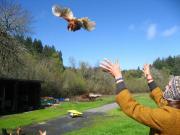Hyperlexic children are often fascinated by letters and numbers. They are extremely good at decoding language and thus often become very early readers. An fMRI study of a single child showed that hyperlexia may be the neurological opposite of dyslexia. Despite hyperlexic children's precocious reading ability, they may struggle to communicate. Their language may develop using echolalia, often repeating words and sentences. Often, the child has a large vocabulary and can identify many objects and pictures, but cannot put their language skills to good use. Spontaneous language is lacking and their pragmatic speech is delayed.
Casa Robino
Shared Hospitality Excavations
